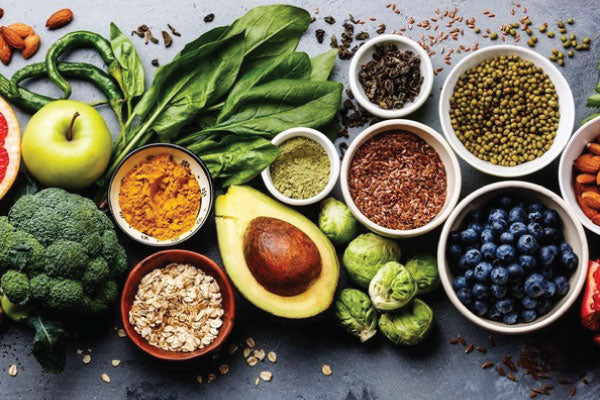When you're dealing with nerve pain, turning to natural remedies often means looking at ways to reduce inflammation and give your nervous system some much-needed support. It's all about calming those overactive nerve signals and encouraging your body's own healing abilities through things like diet, gentle movement, and certain herbal supplements.
Understanding Your Nerve Pain and Natural Solutions
Picture your nervous system as the complex electrical wiring in your house. When everything's working as it should, signals zip along smoothly, letting you feel, move, and go about your day without a thought. But neuropathic pain—or nerve pain—is like that wiring becoming frayed or damaged.
Suddenly, signals get crossed, short-circuit, or just fire off randomly. This creates those all-too-familiar sensations of burning, tingling, shooting pains, or numbness. It's not just a momentary flicker of the lights; it's a constant and often exhausting problem.
And it's a common one. Studies show that neuropathic pain affects a surprising number of people in the UK, with some estimates suggesting it's around 9.2% of middle-aged adults. For anyone living with it, the impact on daily life can be massive, which is why so many are looking for effective natural remedies for nerve pain.
Adopting a Different Approach
While conventional medicine often throws strong medications at the problem to try and mask these faulty signals, a natural approach is more about trying to repair the wiring itself. This means taking a broader look at things and working with your body. Instead of just silencing the alarm, the goal is to find the source of the fire.
That's exactly what this guide is about. We're going to explore practical, evidence-informed ways you can manage your symptoms and improve your overall well-being. The key areas we'll dive into include:
- Anti-inflammatory eating: Finding foods that help calm your nervous system.
- Targeted herbal remedies: Using specific plants known to soothe nerve endings.
- Mindful movement: Gentle exercises that improve blood flow and release your body's natural painkillers.
- Lifestyle adjustments: Simple changes that can support your overall nerve health.
This approach is all about giving you the knowledge and tools to take back some control. It’s about understanding how your body's internal systems, like the endocannabinoid system, help regulate pain and how natural compounds might support its function.
Ultimately, this is a journey to restore balance. By looking at the bigger picture—from what’s on your plate to how you move your body—you can create an environment where your nerves have a better chance to heal. The next sections will give you a clear roadmap to put these ideas into practice.
Fuelling Your Body to Soothe Nerve Pain
What you put on your plate has a massive impact on your body’s pain signals. Think of your nerves as a delicate, high-performance team that needs the right fuel to function properly. When you’re dealing with nerve pain, it's often a sign that this team is under stress, and one of the biggest culprits is chronic inflammation.
Inflammation is your body’s natural response to an injury, but when it becomes chronic, it’s like a low-level alarm that never switches off. This constant state can irritate and damage sensitive nerve endings, cranking up the pain. An anti-inflammatory diet acts as a natural moderator, helping to turn down the volume on this alarm. To get a better handle on how this works, you can read our guide on the signs of chronic inflammation.
The Nerve Repair Crew Your Diet Supports
Imagine your diet as the supply chain for a dedicated "nerve repair crew" working inside you. To do their job well, they need specific tools and materials. Key nutrients are these essential supplies, with each one playing a distinct role in calming inflammation and rebuilding nerve health.
This is why focusing on certain food groups can be one of the most effective natural remedies for nerve pain. It’s not about being restrictive, but about strategically adding powerful, soothing ingredients to your daily meals.
Here are the star players you want on your team:
- Omega-3 Fatty Acids: These are the master firefighters of your diet. You’ll find them in oily fish like salmon and mackerel, as well as in walnuts and flaxseeds. They get to work directly combating inflammatory processes in the body.
- Antioxidants: Think of these as your nerves' personal bodyguards. They protect nerve cells from the damage caused by oxidative stress, a nasty by-product of inflammation. Colourful fruits and vegetables, especially berries, spinach, and kale, are packed with them.
- B Vitamins: This group is the core maintenance crew. Vitamins B1, B6, and B12 are particularly crucial for looking after the myelin sheath – the protective coating around your nerves. A healthy sheath means signals travel smoothly.
Simple Food Swaps for Lasting Relief
Changing your diet doesn't have to be a massive ordeal. The goal is to gradually replace foods that can promote inflammation with ones that fight it. Start small, with manageable swaps you can actually stick with.
For instance, instead of cooking with vegetable oils high in omega-6 (like sunflower or corn oil), make the switch to olive oil or avocado oil, which have much better anti-inflammatory profiles. Instead of grabbing a sugary snack, try a handful of almonds or a small bowl of Greek yoghurt with berries.
Think of it this way: every meal is an opportunity. You can either choose foods that add fuel to the inflammatory fire or foods that help to dampen the flames and support your body’s natural healing.
Building an Anti-Inflammatory Plate
So, how do you put this into practice? Let's look at what a truly anti-inflammatory meal could look like. It’s all about building a balanced plate that’s bursting with nutrients and flavour.
Here’s a simple template to get you started:
- Start with Colourful Vegetables: Aim to fill half your plate with non-starchy veg like broccoli, bell peppers, and leafy greens. The variety of colours ensures you're getting a wide range of antioxidants.
- Add Lean Protein: Include a portion of oily fish, chicken, or plant-based proteins like lentils or chickpeas. This provides the essential building blocks for tissue repair.
- Include Healthy Fats: Don't be shy with healthy fats. Add some avocado, a sprinkle of seeds, or a drizzle of extra virgin olive oil.
- Finish with Anti-Inflammatory Spices: And don't forget the power of your spice rack! Turmeric, which contains the active compound curcumin, is a potent anti-inflammatory. Ginger and garlic also have powerful soothing properties.
By consistently fuelling your body with these nerve-supporting nutrients, you empower your internal repair crew to get the job done. This approach is a cornerstone of managing nerve pain from the inside out.
Using Herbal and Topical Remedies Safely
Stepping beyond diet and exercise, the world of plant-based remedies offers more targeted support for nerve discomfort. From traditional herbal preparations to modern topical creams, these natural options work in some fascinating ways to help calm down overactive nerves. It’s a promising area, but one you need to approach with your eyes wide open, understanding both the potential benefits and the limitations.
It's clear that many people are looking for alternatives. In fact, a recent UK survey found that a staggering 68% of adults would consider plant-based treatments for their neuropathic pain. But as interest grows, it's worth remembering the British Pain Society's advice: ‘natural does not mean safe’. Herbal products can sometimes interact with prescribed medications, so a bit of homework is essential. You can read the full research on plant-based treatments to get a clearer picture of the UK perspective.
This section will walk you through some of the most promising herbal and topical remedies, always with a sharp focus on using them safely and responsibly.
Topical Solutions That Target Pain at the Source
Topical remedies are a great place to start. You apply them directly to the skin over the painful area, which means they offer localised relief without affecting your whole body. For anyone just starting to explore natural remedies for nerve pain, this is a huge plus because it generally means fewer side effects compared to oral supplements.
One of the most well-known is capsaicin cream. Capsaicin is the very same compound that gives chilli peppers their fiery kick. When you first apply it, you'll feel a warming or even burning sensation. But with repeated use, something clever happens: it starts to desensitise the local nerve endings.
Think of it like a doorbell that just won't stop ringing. At first, you jump up every time. But if someone leans on it for ages, you eventually start to tune it out. Capsaicin does something similar to your pain receptors, essentially 'tiring them out' until they stop sending so many frantic pain signals to your brain.
Another popular route involves essential oils. Oils like peppermint and lavender have been used for centuries in aromatherapy and massage for their soothing qualities. Peppermint oil, in particular, contains menthol, which creates a cooling sensation that can act as a welcome distraction from deeper, more persistent nerve pain.
Herbal Supplements for Internal Support
While topicals get to work from the outside in, certain herbs are taken internally to support the nervous system as a whole. These remedies often work by influencing the chemical messengers in your brain or by reducing inflammation throughout your body.
Here are a few that have shown some promise:
- St. John's Wort: Traditionally known for helping with low mood, some research suggests it may also help with certain types of nerve pain. Be warned, though: it's notorious for interacting with a whole host of prescription medications, so it is absolutely essential to chat with your GP before even considering it.
- Passionflower: Famous for its calming properties, passionflower can be a real help for nerve pain that gets worse with stress and anxiety. By helping to relax the body and mind, it can in turn dial down your perception of pain.
- Turmeric: As we touched on in the diet section, the active compound curcumin is a potent anti-inflammatory. Taking it as a concentrated supplement can deliver a much stronger effect than simply sprinkling the spice on your food.
Comparing Popular Herbal and Topical Remedies
With so many options, it can be tricky to know where to start. This table breaks down some of the most common remedies to give you a clearer idea of how they work and what the science says.
| Remedy | How It Works | Best Application | Evidence Level |
|---|---|---|---|
| Capsaicin Cream | Depletes substance P, a neurotransmitter that sends pain signals, effectively "tiring out" local nerve endings. | Localised, superficial nerve pain (e.g., post-shingles pain, diabetic neuropathy in feet). | Strong |
| Peppermint Oil | Contains menthol, which creates a cooling sensation that temporarily distracts from pain signals. | Topical massage for muscular aches that accompany nerve pain; headache relief. | Moderate |
| St. John's Wort | Influences neurotransmitters like serotonin. Its exact mechanism for nerve pain is still being researched. | Oral supplement for nerve pain with a depressive component. Requires medical supervision. | Moderate |
| Passionflower | Boosts GABA (gamma-aminobutyric acid) in the brain, which promotes relaxation and may reduce pain perception. | Oral supplement for nerve pain exacerbated by anxiety or stress. | Emerging |
| Turmeric (Curcumin) | A powerful anti-inflammatory that blocks inflammatory pathways throughout the body. | Oral supplement for systemic, inflammation-driven nerve pain (e.g., sciatica). | Strong |
Remember, this is just a snapshot. The effectiveness of any remedy can be highly individual, and the evidence is always evolving.
The Golden Rule: Safety First
Whatever new herbal or topical product you're thinking of trying, your safety has to be the top priority. Your body is unique, and what works wonders for one person might not be right for you at all.
Before you begin, make these steps non-negotiable:
- Consult Your Healthcare Professional: This is the big one. Always discuss any new remedy with your GP or a qualified medical herbalist, especially if you’re already taking other medications or have underlying health conditions.
- Perform a Patch Test: Don't slather a new cream or oil all over yourself straight away. Test it on a small, discreet patch of skin, like the inside of your wrist. Wait a full 24 hours to check for any redness, irritation, or allergic reaction.
- Start with a Low Dose: If you're trying an oral supplement, begin with the lowest recommended dose. This lets you see how your body responds before you think about increasing the amount.
- Source High-Quality Products: The UK supplement market isn't as tightly regulated as pharmaceuticals. Stick to reputable brands that provide third-party testing reports to prove their products are pure and contain what they say they do.
Things like Omega-3s, antioxidants, and B-vitamins are the essential building blocks for a healthy nervous system. This foundational support works hand-in-hand with the more targeted action of topical remedies. Exploring all avenues, including options like topical CBD products, can give you a more rounded and effective approach to managing your discomfort. Our CBD topical guide can help you understand how these products offer targeted relief, getting to work right where you need it most.
Building Nerve Resilience Through Movement

When every part of you hurts, the last thing you want to do is move. It's a perfectly normal reaction to stay still, hoping you don't trigger another sharp jolt of pain. But here's the thing: gentle, mindful movement can be one of the most powerful natural remedies for nerve pain, helping you build up some real, long-term resilience.
Picture your nerves as tiny rivers. To be healthy, they need a constant, steady flow of blood packed with oxygen and nutrients. When you stop moving, that flow slows right down, almost like a river getting dammed up. This stagnation can make irritated nerves feel even worse and puts the brakes on any natural repair work your body is trying to do.
Gentle exercise gets things flowing again. It boosts circulation to those damaged areas, delivering the vital supplies your nerves are crying out for. It also encourages your body to release endorphins—its very own painkillers—which can bring a wave of welcome relief and lift your mood.
Choosing Low-Impact Exercises for Nerve Health
The trick is to stick to activities that don't jar or strain your body. High-impact stuff can sometimes stir up sensitive nerves, so the aim is to find a rhythm that feels supportive and healing. Low-impact options are your best bet for getting stronger without causing a flare-up.
These types of movement are especially good for nerve pain:
- Swimming and Water Aerobics: The water makes you feel almost weightless, taking all the pressure off your joints and spine. This lets you move freely and build muscle without the usual stress, which is brilliant for conditions like sciatica.
- Tai Chi: This ancient practice is all about slow, flowing movements that improve your balance, flexibility, and sense of where your body is in space. People often call it "meditation in motion" because it's incredibly gentle and helps to soothe the entire nervous system.
- Gentle Cycling: Whether you're on a stationary bike at home or taking a leisurely ride on a flat path, cycling offers a smooth, repetitive motion that gets your heart pumping without pounding your joints.
- Walking: Never underestimate the power of a simple walk. Start with short, easy distances and slowly build up your pace and time. It can make a huge difference to your circulation and nerve function.
The goal isn’t to push through the pain. It’s about finding that sweet spot where you’re challenging your body just enough to promote healing without making things worse. Listen to what your body is telling you—consistency is far more important than intensity.
Retraining Your Brain's Pain Perception
Beyond the purely physical benefits, some mind-body practices can actually change how you experience pain. Nerve pain often creates a nasty cycle where your brain becomes hyper-aware, constantly on high alert for the next pain signal. This heightened state can, ironically, make the pain feel even more intense.
Mind-body practices help to break that cycle. You can think of it as retraining your brain. Instead of a pain signal triggering a five-alarm fire, these techniques teach your brain to view it as just a piece of information—something it can observe without panicking. You're not trying to ignore the pain, but rather to dial down the brain's over-the-top reaction to it.
Practical Mind-Body Exercises to Try at Home
You don't need to do anything complicated to start integrating these practices into your day. Even a few minutes can begin to shift your body's response.
Here are a couple of simple exercises you can try right now:
-
Mindful Breathing:
- Find a comfortable place to sit. Close your eyes and just focus on your breath.
- Don't try to change how you're breathing; simply notice the feeling of the air moving in and out of your body.
- Your mind will wander. When it does, just gently guide your focus back to your breath. Start with just five minutes a day.
-
Gentle Neck Stretches:
- Sit up straight and slowly tilt your right ear towards your right shoulder until you feel a gentle stretch in the left side of your neck.
- Hold it there for 15-30 seconds, breathing deeply. Never force it.
- Come back to the centre and repeat on the other side. This simple stretch can help relieve nerve compression in your neck and shoulders.
By combining gentle physical movement with these mindfulness techniques, you’re doing more than just managing symptoms. You’re taking an active role in your own healing, building a stronger, more resilient nervous system one small step at a time.
Navigating Natural Remedies Safely in the UK
Exploring the world of natural remedies for nerve pain is a great way to feel more in control of your own health. It can be empowering. But it’s really important to remember that 'natural' doesn't automatically mean 'safe'.
Many plant-based supplements and herbal remedies are packed with powerful active compounds. You can think of them like keys designed for specific locks in your body. While some might unlock the door to genuine relief, the wrong one could jam the lock or interfere with another key—your prescribed medication.
This is especially true when it comes to drug interactions. A seemingly innocent herb could change how your body processes a prescription drug, either watering down its effects or, much more seriously, making them dangerously strong. Your health is a finely tuned system, and every new thing you introduce needs careful thought.
Becoming an Informed Partner in Your Healthcare
Think of your GP or specialist as your most important ally on this journey. Being completely open about any natural remedies you're considering isn't about asking for permission. It's about working together as a team to make sure you stay safe.
How you frame that conversation can make a massive difference. Rather than just asking if a remedy is "okay," it’s better to take a more collaborative approach.
Here’s a simple way to structure that chat:
- Be Specific: Name the exact remedy you’re looking into (e.g., "I've been reading about turmeric supplements to help with inflammation").
- Explain Your Goal: Tell them what you hope it will do (e.g., "I'm hoping to find something that helps with the burning sensation in my feet").
- Share Your Research: Briefly touch on what you've learned about how it’s supposed to work.
- Ask About Interactions: This is the big one. Ask directly, "Are there any known interactions with the medications I'm currently taking?"
This shows you’re an engaged patient who takes your health seriously, which makes it much easier for your doctor to give you the best possible advice.
The goal is to integrate these natural approaches into your existing healthcare plan, not to replace it. Professional medical advice is the safety net that lets you explore other therapies with confidence.
Sourcing High-Quality Products in the UK
Once you and your doctor are on the same page, the next hurdle is finding a product you can trust. The UK supplement market can be a bit of a minefield, with a massive difference in quality and purity from one brand to the next.
Low-quality products can be useless at best and harmful at worst, potentially containing fillers, the wrong dose, or even contaminants. That’s why choosing products from reputable sources that are transparent about their quality control isn't just a good idea—it's essential for your safety.
Here are a few key things to look for in a trustworthy brand:
- Third-Party Lab Testing: Good companies aren't afraid to prove their claims. They’ll openly share certificates of analysis (CoAs) from independent labs. This is your proof that the product contains what it says it does and is free from nasty stuff.
- Clear Labelling: The label should clearly list all ingredients, the exact dosage, and any potential allergens. Vague wording or over-the-top claims are a huge red flag.
- UK-Based Manufacturing: Companies that make their products here in the UK generally have to stick to stricter quality standards. This is especially important for products like CBD, where the rules are very specific. You can get a better sense of why this matters by reading a complete guide to UK CBD law and compliance.
By being thorough and putting safety first, you can explore natural remedies with confidence and make choices that genuinely support your well-being.
Your Questions on Natural Nerve Pain Relief Answered
Starting out with natural remedies for nerve pain can bring up a lot of questions. It's totally normal to wonder about how long things take, whether it's safe, and how it all fits in with what your doctor has already told you. This section tackles some of the most common queries, giving you straight, practical answers so you can move forward with a bit more confidence.
Getting your head around the details of natural treatments helps you set realistic expectations and make smarter choices for your own health. Let's get into the questions that are probably on your mind.
How Long Does It Take for Natural Remedies to Work?
One of the biggest differences between grabbing a painkiller and using a natural remedy is the time it takes to feel a difference. While a pill from the chemist might give you relief in an hour, natural approaches are playing a longer game. They work by getting to the root causes of your pain, like ongoing inflammation or not having enough of the right nutrients.
Think of it less like flipping a switch and more like looking after a garden. You've got to water it regularly, make sure the soil is good, and give it time to grow. When you change your diet, for example, you might start to feel a real difference in your pain levels within several weeks to a few months as your body's inflammatory state begins to settle down.
With herbal remedies or supplements, the timeline can be a bit different for everyone. Some people feel small changes within a few weeks, while for others, it might take longer for the effects to build up in their system.
The key thing here is consistency. These aren't 'quick fixes'. They are part of a long-term plan to support and rebalance your nervous system. Every healthy choice you make builds on the last one, creating a snowball effect that can lead to relief that actually lasts.
Can I Use Natural Remedies Alongside My Prescribed Medication?
This is a really important question, and the answer is a definite "only after you've spoken to your doctor." It is absolutely vital to have a chat with your GP or another qualified healthcare professional before you mix any natural remedy with your prescribed medication. This isn't just a suggestion; it's a critical safety step.
Many herbs and supplements can mess with common drugs. St. John's Wort, for instance, is famous for interfering with everything from antidepressants to blood thinners. It can either weaken them or crank up their effects to dangerous levels.
Your doctor knows your full medical history. They can look at your entire treatment plan, spot any potential clashes, and give you advice that's tailored to you. This makes sure that any other therapies you try are actually helping your health, not getting in the way.
Are Natural Treatments Effective for Diabetic Neuropathy?
Yes, natural approaches can be especially useful for managing the symptoms of diabetic neuropathy, which is the most common kind of nerve pain in the UK. This is because a lot of natural remedies directly tackle the underlying issues that drive this specific condition.
Peripheral neuropathy is the most common form of neuropathic pain in the UK, with diabetes being the main cause. It's thought that almost 1 in 10 people aged 55 or over are affected by it. This is where lifestyle-focused natural remedies can really make a difference.
- Dietary Control: This is the big one. By switching to an anti-inflammatory, low-sugar diet, you can help keep your blood sugar levels stable. That's the single most important step in stopping more nerve damage.
- Improved Circulation: Gentle exercise, like walking or swimming, is brilliant for improving blood flow. This is crucial for getting oxygen and nutrients to those damaged nerves, especially in your hands and feet where the symptoms are often the worst.
- Specific Nutrients: Some supplements like Alpha-Lipoic Acid and B vitamins have been studied for their potential to help nerve health in people with diabetes.
While these methods can help with many types of nerve pain, you often see the biggest impact where lifestyle plays such a massive part.
Where Can I Find Qualified Natural Health Practitioners in the UK?
When you're looking for professional advice, you want to find someone who's properly qualified and has the right credentials. In the UK, there are several professional groups that keep registers of accredited practitioners. This gives you peace of mind that they've had the right training and stick to high standards.
If you're looking for expert support, here are some good places to begin your search:
- For Herbal Medicine: The National Institute of Medical Herbalists (NIMH) is the UK's top professional body for herbal practitioners. You'll see the letters MNIMH or FNIMH after their name.
- For Acupuncture: Look for a practitioner who is registered with the British Acupuncture Council (BAcC). Their members have to follow strict codes for safety and professional practice.
- For Nutritional Advice: The gold standard is a Registered Dietitian, who is regulated by the Health & Care Professions Council (HCPC). You could also look for a Registered Nutritionist on the UK Voluntary Register of Nutritionists (UKVRN).
Seeing a qualified professional means you'll get safe, personalised advice that works alongside your existing medical care. It helps you explore your options for natural nerve pain relief without the guesswork.
Taking charge of your own wellness is a powerful step. At SMOKO CBD, we're all about providing high-quality, UK-made CBD products that can support you on that journey. Our lab-tested CBD oils and edibles are designed to help manage persistent pain and bring a sense of calm. Take a look at our range to find a natural addition to your routine. Find out more at https://smokocbd.com.









